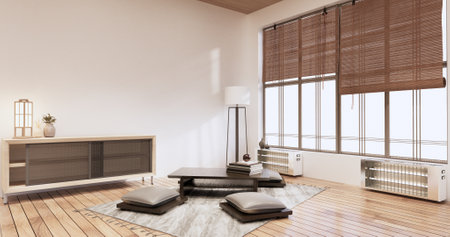Introduction to Feng Shui in Compact London Living
Feng Shui, the ancient Chinese art of harmonising individuals with their surrounding environment, has steadily gained traction in the heart of London. As many city dwellers find themselves living in compact flats, especially within the capital’s bustling boroughs, the need for balanced energy flow becomes both a cultural curiosity and a practical necessity. At its core, Feng Shui revolves around the arrangement of space to encourage positive “Qi” (energy), promoting wellbeing, productivity, and harmony within the home. In the unique context of London flats—characterised by limited square footage and often unconventional layouts—these principles offer fresh perspectives on maximising comfort and functionality. Integrating Feng Shui into modern British interiors doesn’t require sacrificing local style; rather, it invites an elegant blend of tradition and contemporary urban living. By understanding how energy flows through small spaces, Londoners can create effective study areas that foster focus and tranquillity while respecting both the heritage of Feng Shui and the distinctive quirks of metropolitan life.
2. Understanding Energy Flow in Urban Homes
At the heart of Feng Shui lies the concept of Qi (also spelled “chi”), an invisible life force said to flow through every space, shaping the atmosphere and influencing wellbeing. In the context of London’s compact flats—often nestled within Victorian or Edwardian terraces, or converted from Georgian townhouses—this flow of energy can become especially complex. The dense, historic layouts typical of the capital bring both charm and challenge: ornate cornices, bay windows, and narrow corridors are quintessentially British but can interrupt or stagnate Qi if not thoughtfully addressed.
Unlike sprawling suburban homes, London flats must often make do with limited square footage and shared walls. This means that the placement of furniture, study nooks, and even doorways takes on heightened significance. The British habit of multi-functional spaces—think a dining table doubling as a workspace or a living room corner reserved for study—further complicates energy circulation. Let’s take a closer look at some common architectural features and how they might affect Qi:
| British Architectural Feature | Potential Qi Impact | Lifestyle Consideration |
|---|---|---|
| Sash Windows | Can facilitate fresh airflow but may leak warmth, impacting comfort and concentration. | Regular airing out is traditional but needs to balance temperature for study areas. |
| Narrow Hallways | May create bottlenecks, leading to stagnant energy zones. | Shoe racks or coat stands placed thoughtfully prevent blockages. |
| Fireplaces | Focal points that can anchor Qi; unused hearths may collect clutter and stale energy. | Decorative use with candles or mirrors can revitalise this feature. |
| Bays & Alcoves | Offer opportunities for concentrated energy—ideal for study nooks if uncluttered. | Custom shelving or desks fit well without crowding the space. |
The British tendency to value privacy and cosiness (the much-loved “hygge” or “cosy corner”) means that many Londoners prefer smaller, enclosed spaces over open-plan living. However, from a Feng Shui perspective, ensuring that Qi does not become trapped is key. Simple adjustments—such as keeping pathways clear, using light-coloured décor to reflect natural daylight through sash windows, and choosing furniture that doesn’t overcrowd—can harmonise the unique heritage of London homes with modern needs for productivity and relaxation.

3. Selecting the Ideal Study Space
Choosing the right spot for your home study in a small London flat requires thoughtful consideration, especially when aiming to balance energy flow with practical needs. According to Feng Shui principles, the location of your study area can significantly impact both your concentration and overall wellbeing. Begin by observing the available natural light in different corners of your flat. In the often cloudy London climate, maximising sunlight is vital; select a space near a window that receives steady daylight, ideally from the south or east, as these directions are traditionally associated with growth and clarity.
Consideration of Communal Spaces
Next, assess the proximity of potential study spots to communal areas such as the kitchen or lounge. While it may be tempting to tuck your desk away in a busy corner for convenience, Feng Shui encourages maintaining some distance from high-traffic zones. This separation helps create a boundary between work and relaxation, allowing you to focus more deeply and minimise distractions—a necessity in compact urban living.
Supporting Focus and Tranquillity
When space is at a premium, even modest nooks can be transformed into auspicious study areas by mindful arrangement. Opt for locations where you can face towards the room’s entrance but not directly in line with the door—this position, known as the command position, fosters alertness without feeling exposed. If possible, avoid sitting with your back to windows or doors, as this can lead to a sense of vulnerability or restlessness according to traditional beliefs.
Practical Adaptations for Small Flats
In true London style, adaptability is key. Use movable screens or bookshelves to subtly delineate your study zone from living spaces if dedicated rooms aren’t available. Even in open-plan flats, strategic placement of plants or soft furnishings can help anchor energy and visually mark out your workspace. By blending classic Feng Shui wisdom with an understanding of local architectural quirks, you can craft a study environment that feels both harmonious and distinctly British.
4. Furnishing and Layout: Harmonising Function and Flow
In London’s characterful but often compact flats, the arrangement of furniture is pivotal in cultivating both an energised study environment and a harmonious living space. Feng Shui principles can be adapted to suit the city’s design sensibilities—think sleek Scandinavian lines, understated elegance, and a focus on maximising limited square footage. Here are practical tips for arranging your home study area to foster productivity and invite positive energy.
Optimising Desk Placement
The desk should ideally command the room—a classic Feng Shui approach that allows you to face the door without being directly in line with it. This “command position” fosters a sense of security and awareness, enhancing focus. If possible, place the desk near a window to benefit from natural light while avoiding glare on screens. In most London flats, space may dictate a wall-facing desk; if so, add a mirror or artwork ahead to expand your view and uplift your spirits.
Choosing Multifunctional Furniture
Given the spatial constraints of urban living, opt for furniture that serves multiple purposes. Foldable desks, wall-mounted shelves, and storage ottomans are particularly popular in London homes. These pieces streamline visual clutter and ensure energy flows smoothly throughout the room.
Recommended Furniture Choices for Small Flats
| Type of Furniture | Functionality | Feng Shui Benefit |
|---|---|---|
| Fold-away Desk | Saves space when not in use | Keeps energy clear for other activities |
| Wall Shelves | Vertical storage without crowding floor space | Promotes upward energy flow (growth) |
| Modular Bookcase | Customisable storage/display | Encourages order and clarity of mind |
| Storage Ottoman | Doubles as seating and storage | Reduces clutter, grounds the rooms energy |
Clever Zoning for Work-Life Balance
Zoning is key in multi-purpose London flats. Use rugs, lighting, or open shelving as subtle dividers between work and relaxation areas. This maintains distinct energetic zones—vital for mentally switching off after study sessions. Choose décor elements in soothing tones like sage green or muted blues to create calm, yet avoid overwhelming busy patterns that can disrupt concentration.
Quick Tips for Arranging Your Study Space:
- Avoid positioning your back to the main door—use a small plant or screen if you must face away.
- Keep pathways uncluttered; allow at least 60cm clearance around major furniture pieces for ease of movement.
- Select chairs with solid backs to support you both physically and energetically during long study periods.
- Minimise under-desk storage to encourage free-flowing Qi beneath your workspace.
- Add soft textiles like cushions or throws for comfort without overwhelming the minimalistic London aesthetic.
By thoughtfully selecting furnishings and layouts tailored to London’s unique spaces—and balancing function with flow—you transform even the smallest flat into a sanctuary of productivity and wellbeing.
5. Incorporating Local Touches and Greenery
To truly harmonise your study area within a small London flat, it’s essential to weave in elements that are both locally inspired and naturally uplifting. Integrating British motifs and plant life not only grounds your workspace in its urban context, but also enhances the positive energy flow championed by Feng Shui. A well-chosen selection of native plants—such as English ivy, lavender, or even a petite potted fern—can purify the air and inject a sense of vitality into your environment.
Subtle Decorative Choices
Opt for understated, classic décor that nods to British tradition without overwhelming your space. Think along the lines of ceramic mugs with heritage patterns, a vintage-inspired desk lamp, or framed prints depicting local London scenes. These gentle touches serve to create a familiar and comforting atmosphere, which can be especially grounding during periods of focused study.
Traditional Touches for Authenticity
Consider incorporating subtle reminders of British heritage—perhaps a woollen throw in a soft tartan draped over your chair, or a bookshelf adorned with classic English literature. Such elements not only reinforce the sense of place but also invite moments of pause and reflection, crucial for maintaining mental clarity and balance in smaller living quarters.
Bringing Freshness and Comfort
Strategically placed greenery can act as both a visual refreshment and an energy balancer. Positioning a small pot of rosemary or mint on your desk not only offers invigorating scents but also connects you to traditional British gardens. If space is tight, even a simple glass jar with cut wildflowers from a local market can uplift the entire mood of your study area. By thoughtfully blending these local details with Feng Shui principles, your home study becomes not just functional but uniquely welcoming—a true haven amidst the city’s bustle.
6. Practical Feng Shui Adjustments for Londoners
Embracing the unique challenges of London’s compact flats requires both creativity and a mindful approach to energy flow. The following actionable Feng Shui strategies are tailored for city dwellers seeking balance, productivity, and calm within limited space.
Space-Saving Solutions for Study Areas
Small London homes demand efficiency. Opt for streamlined desks with built-in storage or fold-away workstations that can be tucked out of sight after use. Position your study area near natural light if possible, but avoid sitting directly in line with the door – a classic Feng Shui principle to shield against disruptive energy. If space is tight, consider using vertical shelving to keep surfaces clutter-free and to encourage an upward energy movement, which symbolises growth and aspiration.
The Art of Decluttering
Clutter is the arch-nemesis of balanced Chi in any home, especially in petite city flats. Regularly sort through books, papers, and unused tech gadgets; donate or recycle what you no longer need. Introduce attractive baskets or boxes to conceal everyday essentials, maintaining a serene and tidy environment conducive to concentration and peace. Remember: every item should have its place, and every space should have its purpose.
Mirrors: Expanding Space and Energy
Mirrors are invaluable in small London interiors, both visually expanding the area and amplifying beneficial energy. Place mirrors thoughtfully to reflect light into darker corners or to double the presence of inspiring views (never place a mirror facing your desk, as it may bounce away focus and opportunity). Avoid reflecting clutter or sharp angles—mirrors should magnify positivity, not chaos.
Soft Furnishings for Harmony
Textiles play a pivotal role in softening harsh lines and absorbing excess energy in hard-edged city homes. Layer cushions, throws, and rugs in calming colours such as gentle greens or tranquil blues to foster mental clarity and relaxation. Choose fabrics that feel pleasant to the touch; tactile comfort is as important as visual appeal when creating an inviting study nook.
Adapting Over Time
Lifestyle needs evolve—so too should your space. Reassess your layout with each new season or life change; adjust furniture placement or refresh your décor to keep energy flowing freely. This adaptability ensures your home supports both your ambitions and wellbeing amidst the dynamic pace of London living.
7. Conclusion: Creating a Stimulating and Balanced Study Nook
In summary, weaving the ancient wisdom of Feng Shui into the quintessential charm of a London flat offers far more than just aesthetic appeal—it cultivates a sense of well-being, clarity, and productivity within your study nook. The fusion of these two worlds—time-honoured Eastern philosophies and the unique character of British urban living—enables you to make the most of limited space while nurturing your mind and spirit. By paying attention to energy flow, embracing natural light, integrating thoughtful storage solutions, and adding personal touches that reflect both tradition and modernity, you create an environment that is not only harmonious but also deeply motivating. Ultimately, balancing energy flow in your small London flat does not simply transform your home study area; it enhances your daily life, allowing you to thrive academically and personally amidst the bustling heart of the city.


